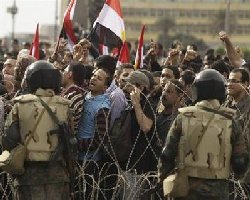After nearly two weeks of anti-government demonstrations in Egypt, the standoff continues between thousands of protesters and the country's embattled president Hosni Mubarak.
The demonstrations entered their thirteenth day on Sunday in the capital, Cairo, where protesters braved rainy weather as they dug in for another night in the city's Tahrir Square, the focal point of the protests.
Al Jazeera's correspondent in the capital said the scene in Tahrir was relatively calm shortly before dawn on Sunday in what has become a "tent city".
Brotherhood joining talks
Meanwhile, in an apparent bid to bring the impasse to an end, Egypt's opposition party, the Muslim Brotherhood, announced that it is joining the dialogue with the government.
The opposition had previously rejected all dialogue until Mubarak steps down. But the group confirmed to Al Jazeera on Sunday that it is joining talks with vice-president Omar Suleiman to end the crisis.
Al Jazeera's correspondent in the capital said the announcement is "highly significant".
"They are interested in talking about the resignation of president Mubarak," he said. "They want parliament resolved, they want those responsible for violence of the last few days put on trial ... and wanting to be able to peacefully protest."
However, Cherif Bassiouni, president of the Egyptian American Society and a former UN human rights expert, said the Muslim Brotherhood has already proved itself to be a responsible participant in Egypt's legislative process.
"They participated in the 2005 legislative elections. They elected 88 members to the parliament. So they've had a role in the secular parliament."
Protesters' demands
The news of the Muslim Brotherhood joining the talks came as protesters vowed not to back down in their demand for Mubarak to step down and end his nearly 30-year-rule.
"They are steadfast and very sure in their aims and refuse to move," our correspondent in Cairo said. "But certainly we haven't seen the massive numbers that we've seen before."
Protest organizers say they must keep up the pressure of large protests, paralyzing the heart of Cairo, to force the government to make a true move to democracy.
"We have to be steady to topple the government," Ahmed Abdel Moneim, a 22-year-old student who has been sleeping in the square for days, said.
"The French Revolution took a very long time so the people could eventually get their rights. ... If we have to spend our life to get rid of Mubarak, we will."
Protest organizers have now called for a "Day of the Martyred" to be observed in honor of those who have died in the protests so far, while Copts in Egypt have called for Sunday prayers this week to be observed in Tahrir Square.
Tough realities
Beyond the square's tank-guarded gates, however, a decidedly more pessimistic view takes hold. Some Egyptians say they are upset that life has ground to a halt and looks to remain that way as long as there is no resolution in sight.
Recognizing the need to keep support among the wider public, protest organizers put out a statement on Saturday denying those claims.
"The broad positive response by the people to our movement's goals reveals that these are the goals of the Egyptian masses in general, not any internal or external faction or entity," it said.
As the crisis drags on, the protesters also face the raw physical toll of camping out, night after night, in the sprawling public square where hunger, illness and injuries might well become a drain.
Political wrangling
Despite the demonstrations, the Egyptian president has remained defiant, refusing to step down immediately, as per the protesters' demands.
However, the leadership of Mubarak's ruling National Democratic Party (NDP) resigned en masse on Saturday, according to state television.
Hossam Badrawi has been appointed the new secretary-general of the party, replacing Safwat El-Sherif, a Mubarak loyalist, in that post. Badrawi, seen by many as a liberal voice in the NDP, will also replace Gamal Mubarak, Hosni Mubarak's son, as head of the party's policies bureau.
Other new appointees include: Dr Mohamed Ragah Ahmed, Dr Mohamed Ahmed Abd El-Illah, Maged Mahmoud Younes El-Shirbiny, Mohamed Ahmed Abd El-Salam Hebah and Dr Mohamed Mostafa Kamal, according to an NDP press release.
Officials in the administration of Barack Obama, the US president, welcomed the resignation of Gamal Mubarak, terming it a "positive" move.
But the administration has continued to insist upon an orderly and peaceful transition in Egypt.
Frank Wisner, who has acted as an envoy for Obama by carrying a message to Mubarak, said on Saturday that the Egyptian president "must stay in office to steer" a process of gathering "national consensus around the preconditions" for the way forward.
PJ Crowley, the US state department's spokesman, has said, however, that Wisner was speaking as a private citizen, and that his views did not represent those of the US government.
"The views he expressed today are his own. He did not coordinate his comments with the US government," Crowley said on Saturday.
Meanwhile, the president of Israel, Shimon Peres, voiced his support for Mubarak on Saturday, saying the Egyptian leader saved lives by "preventing war in the Middle East".
PHOTO CAPTION
Soldier keep guard as opposition supporters line-up to enter Tahrir Square in Cairo February 4, 2011.
Al-Jazeera


 Home
Home Discover Islam
Discover Islam Quran Recitations
Quran Recitations Lectures
Lectures
 Fatwa
Fatwa Articles
Articles Fiqh
Fiqh E-Books
E-Books Boys & Girls
Boys & Girls  Ramadan
Ramadan Fatwa Audios
Fatwa Audios Month of Mercy
Month of Mercy Women
Women Eed Al- Fitr
Eed Al- Fitr Food Recipes
Food Recipes Videos
Videos

 Prayer Times
Prayer Times












